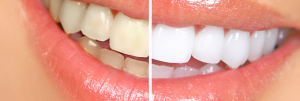What are my teeth whitening options?
How can I whiten my teeth at home?
There are numerous whitening toothpastes on the market. Several have received the American Dental association (ADA) Seal of Acceptance. Whitening toothpastes do not change the color of the tooth but are meant to remove surface stains through gentle polishing or chemical reaction. Home tooth-whitening kits are designed to change the color of teeth by bleaching them. They contain peroxide(s) that work on both surface and deep stains. Be sure to talk to your teeth whitening dentist before attempting to whiten your teeth at home with a bleaching kit. It is important to make sure any use of a bleaching agent is properly done in the context of the dental treatment plan designed by your teeth whitening dentist.
What is the difference between home tooth-whitening kits and professional tooth whitening?
 Tooth-whitening kits available over the counter (OTC) can be done at the purchaser’s discretion. It is important that you follow all instructions as written, and you should consult your dentist before trying any at home whitening kit. Professional tooth whitening may involve one treatment at your dentist’s office or your dentist may do an initial bleaching and have you follow up with specific instructions at home to complete the process. OTC tooth whitening kits generally have a lower concentration of peroxide, typically hydrogen peroxide. Teeth whitening dentist prescribed treatments contain a higher concentration of carbamide peroxide and/or hydrogen peroxide.
Tooth-whitening kits available over the counter (OTC) can be done at the purchaser’s discretion. It is important that you follow all instructions as written, and you should consult your dentist before trying any at home whitening kit. Professional tooth whitening may involve one treatment at your dentist’s office or your dentist may do an initial bleaching and have you follow up with specific instructions at home to complete the process. OTC tooth whitening kits generally have a lower concentration of peroxide, typically hydrogen peroxide. Teeth whitening dentist prescribed treatments contain a higher concentration of carbamide peroxide and/or hydrogen peroxide.
What are the risks of tooth whitening?
The most common problem associated with bleaching agents used to whiten teeth is discomfort related to increased tooth sensitivity. Soft tissue irritation is likely to result from trays that do not properly fit the mouth. The longer the exposure and the higher the concentration of the peroxides used for tooth whitening, particularly hydrogen peroxide, the greater the risk of gum irritation or increased tooth sensitivity. If the gums are not sufficiently protected, the irritation can move beyond a burning sensation to severe tissue damage. There is also a possibility of enamel or pulp damage. If you choose to bleach your teeth, always follow manufacturer and teeth whitening dentist instructions.
Will brushing with a whitening toothpaste really improve my smile?
Whitening toothpastes are made to remove discoloration and stains on the surface of your teeth. They are not made not change the color of your teeth. If you would like to brighten the look of your smile by removing surface stains, a whitening toothpaste may help.
Are there other tooth-whitening options besides toothpaste or bleaching?
For more stubborn discoloration, bleaching may not be a sufficient alternative, especially without risking damage to the teeth or gums. The results of the OTC and even professional tooth-whitening methods are also temporary, as the natural tooth is still prone to staining. To deal with severe staining, particularly on teeth that are already sensitive or damaged, veneers are a good option that will also provide long-term results. Veneers are custom made to fit over your natural teeth. As well as improving the look of severely stained or yellowed teeth, they can also be used to return structural integrity to weakened teeth.
- Learn more about Dental Veneers
Talk to your dentist or our teeth whitening dentist about the benefits and risks of any teeth whitening treatment or procedure you consider.
- Learn more about Teeth Whitening and other Cosmetic Dentistry
Call us for more information (617) 600-3442
or
